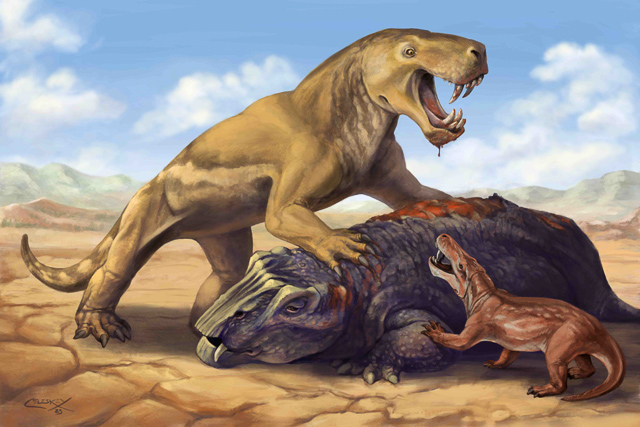South African fossils reveal ancient beast’s epic journey to oblivion
For immediate release ‐ June 01, 2023
Paleontology
Contact: Kerry Irish, 919.707.9823. Images available upon request
 Permian saber-toothed protomammal Inostrancevia africana is confronted by the much smaller gorgonopsian, Cyonosaurus, over the apex predator’s dicynodont prey. Illustration: Matt Celeskey. Click to enlarge.
Permian saber-toothed protomammal Inostrancevia africana is confronted by the much smaller gorgonopsian, Cyonosaurus, over the apex predator’s dicynodont prey. Illustration: Matt Celeskey. Click to enlarge.
By Will Dunham, Reuters
WASHINGTON, May 22 (Reuters) – It was a dire moment for life on Earth. Runaway global warming triggered by calamitous volcanism in Siberia inflicted the worst mass extinction on record – dooming perhaps 90% of species – roughly 252 million years ago at the end of the Permian Period.
Unlike the asteroid 66 million years ago that ravaged the dinosaurs, this extinction event unfolded over a protracted time span, with species perishing one by one as conditions worsened. Scientists said on Monday fossils unearthed in South Africa provide a peek into this drama, telling the tale of an apex predator that over multiple generations migrated halfway around the world in a desperate, and ultimately failed, bid to survive.
This beast, a tiger-sized, saber-toothed mammal forerunner called Inostrancevia, had been known only from fossils excavated in Russia’s northwestern corner bordering the Arctic Sea until new remains were discovered at a farm in central South Africa.
Read the full story on Reuters
NC Museum of Natural Sciences Research Curator for Paleontology, Dr. Christian Kammerer, was the lead author of the study in the journal Current Biology.
“Our findings underscore the complexity of faunal turnover around mass extinctions, something which really only becomes clear when you are dealing with such a rich and finely-resolved record as that of the Karoo [Basin],” Kammerer said.
For more information about our upcoming activities, conservation news and ground-breaking research, follow @NaturalSciences on Instagram, Twitter and Facebook. Join the conversation with #visitNCMNS.

